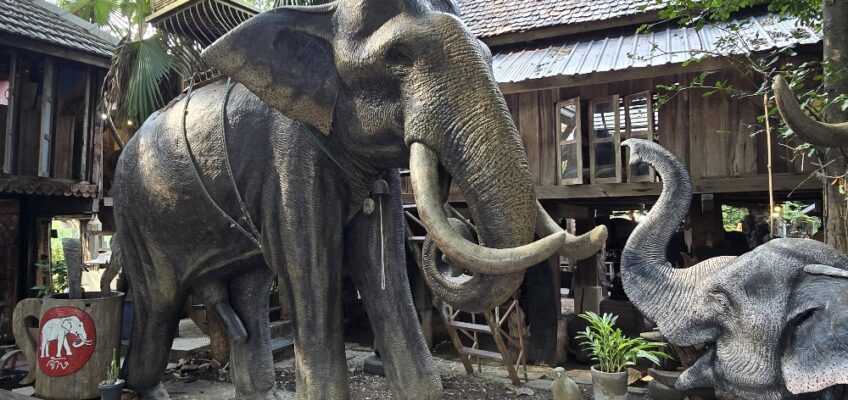If you walk around the street markets in Chiang Mai, you’ll find an amazing variety of artifacts. Wood carving, silk-screen prints, paintings, t‑shirts, and so many other items. Of course there is some cheap, tacky stuff, and there are also some very nice pieces of art and handicraft. The common theme among all of them is elephants.
We also visited a museum that’s actually the home and workshop of an artist who specializes in wood carving and concrete sculpture, and who is inspired by elephants. The name of the museum is Baan Jang Mak, which means “House Full of Elephants.”
Thailand should be called “Country Fuil of Elephants.”
Of course, I exaggerate.
Chiang Mai is also a delightful city with some beautiful Buddhist temples. And maybe because this is my first time visiting any Buddhist temples, I’m in awe.
I’m awestruck as well at the night markets. The crowds, the sounds, the smells, the colors, the lights, and the things you can buy are fantastic.
So here’s just a little about the elephants and the other things.
Temples
Right after we arrived in Chiang Mai, we visited Wat Phra Singh. Construction of this temple complex began in 1345, and a statue of Phra Buddha Singh arrived there in 1367, giving the Wat its name. When Burma ruled northern Thailand, between 1578 and 1774, the temple fell into disrepair. A number of restorations since then have returned it to its current state, and it’s current state is magnificent!
The Buddha statues are impressive, but for me the real highlight were the stunning murals on the walls of one of the temples. And the architecture, especially the ornate woodwork on the facades of the temples, was magnificent.
I visited a number of other temples, some with our group and some on my own while wandering around the city during free time.
Nature
We went on a hike outside the village of Mae Kampong. (Actually, only two of us went on the hike. Everyone else opted for a coffee break.)
Padaung
The Karen people are an ethnic group from Burma (Myanmar), but that’s oversimplifying it. There are actually many different ethnic groups that don’t associate or identify with each other culturally or linguistically. One tribe of one of the Karen subgroups, the Padaung, have a community near Chiang Mai, and we visited them.
The Padaung women are known for their neck rings. They wear brass rings around their necks. These heavy rings push down the collar bones, compress the rib cage, and elongate the neck. The women who do this say it’s about cultural identity, though it’s uncertain how the practice originated. Possibly it made the women less attractive to other tribes, so they would not be enslaved. And it may have been a way to enhance their beauty and sexual attractiveness within their tribe.
I have to admit it felt a little voyeuristic to be touring their community and taking their photos, but they were happy to pose for us. Several of the women were working with handheld looms and making beautiful scarves. All were selling various handcrafted objects, such as wood carvings and jewelry. (Elephants were a common theme.)
Elephant Camp
I got to have another encounter with live elephants.
Unlike the experience I had in Ao Nang, Elephant EcoValley is not an elephant sanctuary, but rather a camp. The elephants here are not rescues. They are domestic elephants whose owners basically board them here, or in some cases they were born at the camp. And the experience here was more educational. In Ao Nang we basically just fed the elephants, posed with them, and bathed them. Here we had both of those activities, but we also made some food for them (by crushing the ingredients and shaping them into balls) and we learned how elephant dung is used to make paper.
I didn’t do the bathing this time, since I already did that once (and once was enough really).
Traditional Music and Dance
On our last night in Chiang Mai we attended a dinner show with traditional music and dance. The food was good, and the dance was beautiful. The music, played on traditional instruments, was interesting and repetitive. The effect was mesmerizing.
I have lots more photos and videos from Chiang Mai. Check them out. You’ll see street scenes and lots of elephant stuff. Not to mention food.
We just arrived in Chiang Rai, and I’ll have more stories to share in a few days.



tammy vig
Cool beans, I love elephants. We just watched a 60 minutes segment on the elephants in Thailand. We hate heat and humidity too, but we still hope to get to this part of the world at some point. Enjoy!
Timothy Welch
Thanks for the photos. I recognized the “temple” photo that you indicated you didn’t know what it was called. That is actually the manuscript depository at the Wat Muen Larn.